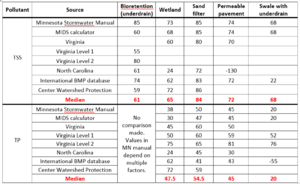
Difference between revisions of "Updates to credits and pollutant removal values"
(Created page with "This page provides summaries and justification for changes in BMP pollutant removal credits and BMP pollutant removal efficiencies. ==July, 2017 change in TSS credit for bior...") |
m |
||
| Line 2: | Line 2: | ||
==July, 2017 change in TSS credit for bioretention== | ==July, 2017 change in TSS credit for bioretention== | ||
| + | [[File:Pollutant removal numbers.png|300px|thumb|alt=image of pollutant removal table|<font size=3>Summary of data on pollutant removal efficiencies for various sources.</font size>]] | ||
| + | |||
The MPCA conducted a review of pollutant removal credits for total suspended solids (TSS) and phosphorus. The objective was to evaluate existing credits in the Minnesota Stormwater Manual and the Minimal Impact Design Standards calculator and determine if the credits needed adjusting. The BMPs examined were biofiltration (bioretention with underdrain), constructed stormwater wetland, sand filter, permeable pavement (with underdrain), and swale. | The MPCA conducted a review of pollutant removal credits for total suspended solids (TSS) and phosphorus. The objective was to evaluate existing credits in the Minnesota Stormwater Manual and the Minimal Impact Design Standards calculator and determine if the credits needed adjusting. The BMPs examined were biofiltration (bioretention with underdrain), constructed stormwater wetland, sand filter, permeable pavement (with underdrain), and swale. | ||
| Line 10: | Line 12: | ||
*[http://www.bmpdatabase.org/Docs/2014%20Water%20Quality%20Analysis%20Addendum/BMP%20Database%20Categorical_StatisticalSummaryReport_December2014.pdf 2014 International Stormwater BMP Database] | *[http://www.bmpdatabase.org/Docs/2014%20Water%20Quality%20Analysis%20Addendum/BMP%20Database%20Categorical_StatisticalSummaryReport_December2014.pdf 2014 International Stormwater BMP Database] | ||
*[http://owl.cwp.org/mdocs-posts/fraley-mcneall-_national_pollutant_removal_perf_v3/ Center for Watershed Protection National Pollutant Removal Performance Database – Version 3] | *[http://owl.cwp.org/mdocs-posts/fraley-mcneall-_national_pollutant_removal_perf_v3/ Center for Watershed Protection National Pollutant Removal Performance Database – Version 3] | ||
| − | |||
| − | |||
The table to the right summarizes the results. To access the date table used to generate the summary information, [[file:Pollutant removal numbers.xlsx]] | The table to the right summarizes the results. To access the date table used to generate the summary information, [[file:Pollutant removal numbers.xlsx]] | ||
The data indicate the Minnesota Stormwater Manual reasonably agrees with values from the other sources with the exception of TSS in biofiltration BMPs. The Construction Stormwater General Permit states that filtration systems must be designed to remove at least 80 of TSS. Consequently, the removal percentage for biofiltration practices must be at least 80 percent. We thus lowered the TSS credit for biofiltration to 80 percent. Biofiltration practices include tree trenches and tree boxes. | The data indicate the Minnesota Stormwater Manual reasonably agrees with values from the other sources with the exception of TSS in biofiltration BMPs. The Construction Stormwater General Permit states that filtration systems must be designed to remove at least 80 of TSS. Consequently, the removal percentage for biofiltration practices must be at least 80 percent. We thus lowered the TSS credit for biofiltration to 80 percent. Biofiltration practices include tree trenches and tree boxes. | ||
Revision as of 17:31, 14 July 2017
This page provides summaries and justification for changes in BMP pollutant removal credits and BMP pollutant removal efficiencies.
July, 2017 change in TSS credit for bioretention
The MPCA conducted a review of pollutant removal credits for total suspended solids (TSS) and phosphorus. The objective was to evaluate existing credits in the Minnesota Stormwater Manual and the Minimal Impact Design Standards calculator and determine if the credits needed adjusting. The BMPs examined were biofiltration (bioretention with underdrain), constructed stormwater wetland, sand filter, permeable pavement (with underdrain), and swale.
We reviewed the following data sources.
- Chesapeake Bay Established Efficiency table
- Virginia Stormwater BMP Clearinghouse
- North Carolina Stormwater Control Measure Credit Document
- 2014 International Stormwater BMP Database
- Center for Watershed Protection National Pollutant Removal Performance Database – Version 3
The table to the right summarizes the results. To access the date table used to generate the summary information, File:Pollutant removal numbers.xlsx
The data indicate the Minnesota Stormwater Manual reasonably agrees with values from the other sources with the exception of TSS in biofiltration BMPs. The Construction Stormwater General Permit states that filtration systems must be designed to remove at least 80 of TSS. Consequently, the removal percentage for biofiltration practices must be at least 80 percent. We thus lowered the TSS credit for biofiltration to 80 percent. Biofiltration practices include tree trenches and tree boxes.
